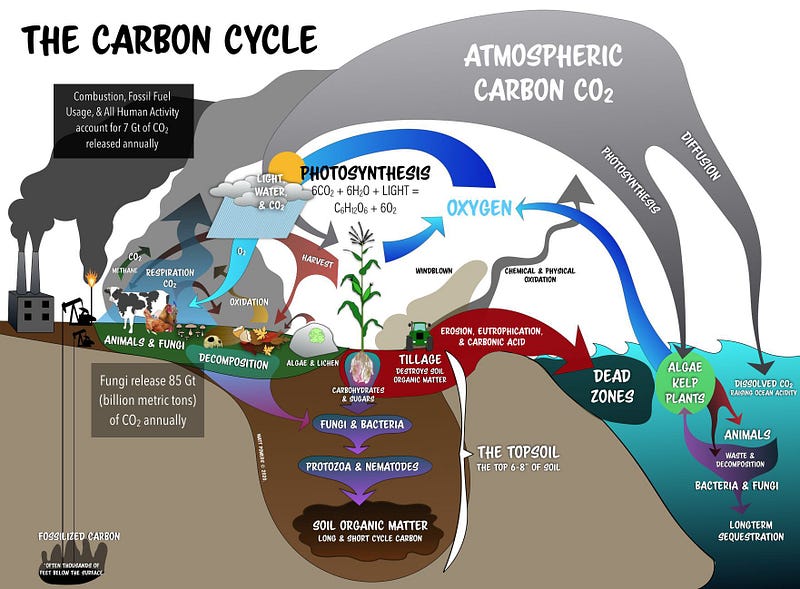Whales and Oceans: Guardians of Our Climate and Breath
Written on
The Transformative Power of the Ocean
My experience over the last couple of months in Ibiza has profoundly influenced me. Being close to such pristine waters has provided me with clarity and purpose. The rugged beauty surrounding the island has ignited a sense of personal passion and empowerment within me. Es Vedra, known as the Mother of Rocks in Ibiza, has played a pivotal role in this transformation.
I believe there are actions I can take to positively impact our world. As a storyteller and a creator of futures, I have the ability to inspire others to reconnect with our planet and discover their own paths forward.
What journey are we embarking on? It’s essential for us to understand what it means to be human in a world governed by natural cycles and feedback mechanisms, as well as the overwhelming thoughts that often obscure our perspectives.
Today, I wish to shed light on the importance of our oceans and the whales that inhabit them. Whales play a significant role in climate regulation, and by understanding how they contribute to this process, we can learn to do the same.
The Ocean: Earth's Essential Lungs
Let’s begin with a thought-provoking question: Are trees the lungs of our planet? The answer is yes, as trees absorb carbon dioxide and release oxygen through photosynthesis. But did you know that trees are formed in the air, utilizing sunlight and chemical processes? The sunlight facilitates the separation of carbon and oxygen, with carbon serving as a fundamental building block for the tree's structure, while oxygen enriches the atmosphere for all living beings.
Forests, particularly biodiverse tropical rainforests, are vital for cooling the planet and maintaining ecological balance. However, while trees are indeed important, they are not the most crucial lungs of the Earth—the oceans hold that title.
The Earth operates as a self-regulating system where various elements work in harmony, as illustrated in Matt Powers' drawing included in my narrative, “A Permaculture Perspective on Climate Change.”

Oceans are teeming with plankton, a term that encompasses a myriad of organisms in water (or air) that cannot swim against currents or winds. The health of our planet, its ecosystems, and all living beings hinges on these microorganisms. They play a critical role in ensuring life is sustainable for both animals and humans.
To delve deeper into the significance of microorganisms, I recommend watching the documentary Symbiotic Earth, which emphasizes their role in evolution.
Plankton acts as a biological carbon pump, removing CO2 from the atmosphere. I do not support industrial interventions that attempt to enhance this natural pump, but it is undeniable that plankton is crucial for our planet’s oxygen and carbon balance.
Whales: Nature's Harvesters
Whales primarily feed on plankton, which led some scientists to mistakenly believe that reducing whale populations would benefit plankton growth. This reductionist viewpoint is misguided. Instead, we should recognize that sustainable harvesting, which adheres to two essential principles—never taking more than you need and never exceeding half of any given resource—can lead to abundance.
Remarkably, the largest creatures on Earth, whales, excel at carbon sequestration. A single whale can absorb approximately 33 tons of CO2 throughout its life, and upon death, it sinks to the ocean floor, effectively storing that carbon for extended periods. In comparison, a tree sequesters only about 1.5 tons of CO2 in the same timeframe.
According to research published in Plos One, restoring large populations of baleen whales could sequester carbon equivalent to that absorbed by 110,000 hectares (272,000 acres) of forest. If land scarcity is a concern in tackling climate change, we must consider the restoration of whale populations.
Breath: The Essence of Life
Now that we’ve explored the importance of oceans and whales, let’s reflect on breath, which is at the core of our existence. In the context of the COVID-19 pandemic, breathing has become a focal point. Solutions will emerge when we learn to slow down and cultivate mindfulness, which begins with our breath.
During my time in Ibiza, I immersed my feet in the ocean and took deep, restorative breaths. An ode to the ocean emerged in my mind—an homage to the waves, the whales, and the plankton thriving beneath the surface. My connection to the ocean reminded me of the profound interdependence of all life forms.
While standing there, I felt a deep sense of joy and connection, realizing that my existence is part of a much grander scheme. My words have the power to inspire change.
So, did you ever find yourself enchanted by the sea, the ocean, or the majestic whales that roam its depths? I would love to hear your stories.
In this video, discover how whales play an essential role in maintaining our climate and the intricate relationships within ocean ecosystems.
This remastered documentary delves deeper into the impact of whales on climate change, showcasing their vital functions and the need for their conservation.